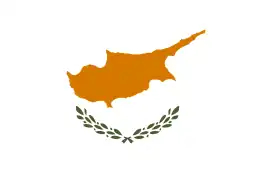European Democratic Party
The European Democratic Party (EDP; French: Parti démocrate européen, PDE), also known as the European Democrats, is a centrist[1][2][3][4] European political party in favour of European integration. François Bayrou is the party's president.
European Democratic Party | |
|---|---|
 | |
| President | François Bayrou |
| Secretary-General | Sandro Gozi |
| Founded | 9 December 2004 |
| Split from | European People's Party |
| Headquarters | Rue Montoyer 25, 1000 Brussels, Belgium |
| Think tank | Institute of European Democrats |
| Youth wing | Young Democrats for Europe (YDE) |
| Ideology | Centrism[1][2][3][4] Pro-Europeanism[5] |
| Political position | Centre[1][2][3][4] |
| European Parliament group | Renew Europe |
| Colours | Blue Orange |
| European Parliament | 12 / 705 |
| European Council | 0 / 27 |
| European Commission | 0 / 27 |
| European Lower Houses | 90 / 9,874 |
| European Upper Houses | 35 / 2,714 |
| Website | |
| www | |
All of the EDP's MEPs currently sit in the liberal Renew Europe group. The youth wing of the EDP is the Young Democrats for Europe (YDE).
As of 2022, one EDP member participates in the national government of an EU member state: Bayrou's Democratic Movement in France, which supports the government of Prime Minister Élisabeth Borne. A European region is also led by an EDP politician, with Spain's Basque Country being led by Iñigo Urkullu of the Basque Nationalist Party; EDP member Free Voters participates as a junior coalition partner in the state government of Bavaria in Germany.
History
European Democratic Party was initiated on 16 April 2004 and formally founded on 9 December 2004 in Brussels.
François Bayrou of the Union for French Democracy and later the Democratic Movement (MoDem) and Francesco Rutelli, former leader of the Democracy is Freedom and Alliance for Italy parties, served as the two co-presidents until 2019. Now, François Bayrou serves as the only president.
The EDP was founded in reaction to the rising influence of Eurosceptic parties within European institutions. It drew pro-European centrist parties from the European People's Party (EPP) group to form a new centrist multinational bloc. Its co-founder François Bayrou described it as a party for people being neither conservative nor socialist."
Since the beginning of the 6th European Parliament of 2004–2009, the EDP has formed a joint European parliamentary group with the Alliance of Liberals and Democrats for Europe Party called the Alliance of Liberals and Democrats for Europe (ALDE) group. This parliamentary group was dissolved in 2019 and replaced by Renew Europe.
The European Democratic Party is ideologically centrist and federalist.[6] Some major members and affiliated parties like EAJ-PNV, Free Voters, MoDem, MCC, Canarian Coalition and the disbanded Democracy is Freedom – The Daisy follow a Christian democratic or liberal conservative line.
Members
Members are national and regional political parties as well as members of the European Parliament, national and regional parliaments.
| Country or Region | Party | European MPs | National MPs |
|---|---|---|---|
| Citizens' Forum Austria (Bürgerforum Österreich, FRITZ) | - | - | |
| Marie-Christine Marghem (MR and MCC; Individual member) | - | 1 / 150
0 / 60 | |
| People's Party - Reformists (Narodna stranka – Reformisti) | - | 1 / 151 | |
| Citizens' Platform (Platforma Politon; Affiliated Member) | - | - | |
| Senator 21 (Senátor 21) | - | 0 / 200
4 / 81 | |
| Democratic Movement (Mouvement démocrate) | 5 / 79 |
48 / 577
4 / 348 | |
| Catherine Chabaud (MoDem; Individual member) and Sandro Gozi (IV; Individual member) | 2 / 79 |
- | |
| Free Voters (Freie Wähler) | 2 / 96 |
0 / 735 (Bundestag)
2 / 69 (Bundesrat) | |
| Union of Centrists (Ένωση Κεντρώων) | - | - | |
| New Start (Új Kezdet) | - | 1 / 199 | |
| Italia Viva | 1 / 76 |
9 / 400
6 / 200 | |
| L'Italia c'è | 0 / 76 |
0 / 400
0 / 200 | |
| Popular Platform - New Times (Piattaforma Popolare - Tempi Nuovi)[7] | - | - | |
| Marian Harkin (Independent; Individual member) | - | 1 / 160 | |
| 50PLUS | 0 / 29 |
0 / 150
1 / 74 | |
| Alliance of Democrats (Stronnictwo Demokratyczne) | - | - | |
| Together for the People (Juntos pelo Povo) | - | - | |
| Future Republic (Repubblica Futura) | Not an EU member | 6 / 60 | |
| Democratic Party of Pensioners of Slovenia (Demokratična stranka upokojencev Slovenije) | - | 0 / 90 | |
| Basque Nationalist Party (Euzko Alderdi Jeltzalea) | 1 / 58 |
6 / 350 10 / 265 | |
| Canarian Coalition (Coalición Canaria) | - | 1 / 350 1 / 265 | |
| Commitment to Galicia (Compromiso por Galicia) | - | - | |
| Young Democrats for Europe[8] (Jeunes Démocrates européens; Affiliated Member) | - | - |
Former member parties
 Croatia : National Forum (Nacionalni forum), joined EDP in 2014, disbanded in 2015
Croatia : National Forum (Nacionalni forum), joined EDP in 2014, disbanded in 2015 Cyprus:
Cyprus:
 Czech Republic:
Czech Republic:
- Party for the Open Society
- Way to Change, founding member of EDP, disbanded in 2009
 France: Union of Democrats and Independents joined the ALDE party on 2 December 2016
France: Union of Democrats and Independents joined the ALDE party on 2 December 2016 Italy:
Italy:
- Democracy is Freedom – The Daisy, founding member of EDP, merged into the Democratic Party in 2007, MEPs Mario Pirillo, Silvia Costa and Vittorio Prodi stayed as individual members until 2014, now member of PES
- Alliance for Italy, party disbanded by the end of 2016
- European Democratic Party Italy (Partito Democratico Europeo Italia) disbanded in 2021.
- Azione, left in September 2023
 Lithuania: Labour Party, left in 2012 to join the ALDE party
Lithuania: Labour Party, left in 2012 to join the ALDE party Romania
Romania
- PRO Romania (PRO România), left in 2022 to join Party of European Socialists[9]
- Association of Italians of Romania, left in 2022
 Slovakia:
Slovakia:
- People's Party – Movement for a Democratic Slovakia, joined EDP in 2009, disbanded in 2014, succeeded by Democratic Slovakia Party
- Democratic Slovakia Party ('Strana Demokratického Slovenska') and European Democratic Party (Europska Demokraticka Strana) in 2019
- Alena Bašistová[10] (Independent), not reelected in 2020
Elected representatives of member parties
European institutions
| Organisation | Institution | Number of seats |
|---|---|---|
| European Commission | 0 / 28 | |
| European Council (Heads of Government) | 0 / 28 | |
| Council of the EU (Participation in Government) | 3 / 28 | |
| European Parliament | 12 / 705 | |
| Parliamentary Assembly | 4 / 318 |
References
- Nordsieck, Wolfram (2019). "European Union". Parties and Elections in Europe.
- John McCormick (2015). European Union Politics. Palgrave Macmillan. p. 247. ISBN 978-1-137-45340-2.
- Lars Pehrson (12 June 2009). How Unified Is the European Union?: European Integration Between Visions and Popular Legitimacy. Springer. p. 160. ISBN 978-3-540-95855-0.
- Oskar Niedermayer (1 May 2013). Handbuch Parteienforschung. Springer. p. 831. ISBN 978-3-531-18932-1.
- Nathalie Brack; Olivier Costa (2014). How the EU Really Works. Ashgate Publishing, Ltd. p. 120. ISBN 978-1-4724-1465-6.
- Alberto Martinelli & Alessandro Cavalli (2020). European Society. Vol. 133. Brill. p. 237. ISBN 9789004351776.
The European Democratic Party (EDP) is a centrist, social-liberal, and federalist party that stands for a more democratic, integrated EU closer to its citizens. Between 2004 and now (end of 2019) the EDP has formed a joint European parliamentary group with ALDE.
- Merlo, Giorgio (17 October 2023). "Tempi Nuovi ha scelto il PDE per motivi di coerenza". Il Domani d'Italia (in Italian). Retrieved 18 October 2023.
- "Adoption of the EDP manifesto and new member organisation | European Democrats – European Democratic Party". www.democrats.eu. Retrieved 19 April 2019.
- robin (15 October 2022). "PES Congress welcomes new PES leadership team and four new member parties". The Party of European Socialists. Retrieved 26 November 2022.
- Democrats, European (30 June 2017). "Individual membership request from MP Alena #Bašistová (SK) has just been accepted by the #EDPCouncil in #Coimbra. Welcome! #EDPCoimbrapic.twitter.com/RiOAZGrfQ7". @PDE_EDP. Retrieved 31 July 2017.